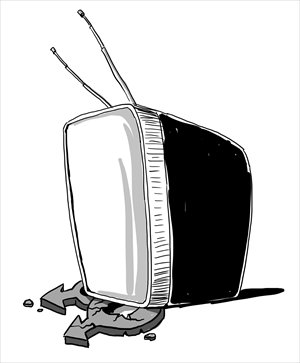Chinese drama can come out of closet and catch up with public

Marriages are common over the "Golden Week," October's National Day holiday. Normally they draw attention only from friends and family. But the wedding of Lu Zhong and Liu Wanqiang in Ningde, Fujian Province on October 2 drew crowds of onlookers with no personal interest in the couple. Lu and Liu are both men, and this was the first public gay wedding in China.
And the reaction of the crowds, numbering up to 1,000 people, seemed ecstatic. One cab driver told the South China Morning Post the scene was "grander than the Chinese New Year."
Although not officially recognized, Lu and Liu's loving union certainly wasn't unpopular.
But however accepted gay love might be in real life, you won't find it in Chinese TV. GLBT characters are essentially non-existent in Chinese dramas, despite the presence of a substantial number of GLBT writers and actors. Homosexuality is dismissed by anxious producers as unacceptable and threatening.
This stands in contrast with US TV. A recent survey showed that 4.4 percent of characters in US TV shows last year were depicted as GLBT, a record high that watches the actual proportion of openly GLBT people in US society, roughly 4 to 5 percent.
But it's not just Americans. Polls show that the Chinese public, especially young people, are increasingly accepting of homosexuality. A survey of 85,000 under-30s by dating website jiayuan.com found that 83 percent of them had "no disapproval" of homosexuality.
Support for gay marriage is relatively low, at roughly 30 percent according to 2009 polls, but rapidly growing. Japanese yaoi comics, featuring male-on-male romance, are popular among young Chinese women.
In other words, even straight Chinese are perfectly ready for gay characters on their TV shows.
There may be a certain conservatism among producers because the primary demographic of much Chinese television is older women, as the young tend to turn to Western or Korean drama for their entertainment.
Yet it's this conservatism that restricts Chinese TV's success to a limited domestic audience mostly consisting of older watchers.
It's rare that it tells stories that truly resonate with the younger generations. The absence of GLBT characters, for a generation of young people who, even if not GLBT themselves, often have friends who are, is one sign of this disconnect.
South Korea, which produces the most popular dramas in East Asia, used to equally erase GLBT characters from its shows, and still has some anti-gay laws technically on the books. But recently, GLBT issues and characters have been explored in series like Secret Garden, Miss Ripley, and Life is Beautiful.
And some parts of China are far more progressive. Hong Kong films and dramas feature many GLBT characters. Taiwan's most famous film director, Ang Lee, has made a point of highlighting GLBT issues, including his smash US hit Brokeback Mountain, which proved equally popular with Chinese audiences on pirate DVD.
China has a rich cultural heritage of engagement with homosexuality. The Dream of the Red Chamber, one of the "four great novels" of China, features plenty of same-sex romance and sexuality.
Many parts of Chinese culture once dealt playfully, curiously, and humanely with sexual variation. In part, it was an inflexible and dogmatic version of Western ideas about sexuality, expressed both through the influence of Christianity and Marxism, that led to the crumbling of this tolerance.
If China wants to promote its soft power, then the tradition of benign tolerance and sexual flexibility exemplified in such works offers a chance to show the world sexual acceptance with Chinese characteristics.
China's most successful movies abroad, such as Farewell My Concubine, have often dealt honestly with these issues. But as long as authorities and media stick to an outdated, puritanical, and ultimately un-Chinese notions of what's "acceptable" or "normal," China will not only lag behind in an increasingly GLBT-friendly world, but will let down the values of its own citizens.
The author is a copy editor with the Global Times. jamespalmer@globaltimes.com.cn